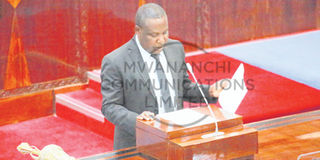Over one million Tanzanians face food shortage : minister

The Minister of Agriculture, Livestock and Fisheries, Dr Charles Tizeba, reads a government statement in Parliament, Dodoma, on the food situation in the country yesterday. PHOTO I EMMANUEL HERMAN
What you need to know:
- Tabling the report on the state of food supply in the country, the minister for Agriculture, Livestock and Fisheries, Dr Charles Tizeba, told the august House that, according to an evaluation conducted last month by his office in collaboration with the Food and Agriculture Organisation, the World Food Programme (WFP), Tanzania Food and the Nutrition Centre, Sokoine University of Agriculture and the University of Dodoma, 55 municipal councils across the country were facing food shortage.
Dodoma. The government yesterday told the Parliament that more than one million people were experiencing food shortage in the country.
Tabling the report on the state of food supply in the country, the minister for Agriculture, Livestock and Fisheries, Dr Charles Tizeba, told the august House that, according to an evaluation conducted last month by his office in collaboration with the Food and Agriculture Organisation, the World Food Programme (WFP), Tanzania Food and the Nutrition Centre, Sokoine University of Agriculture and the University of Dodoma, 55 municipal councils across the country were facing food shortage.
“The evaluation indicates that 35,491 tonnes of food are required for supply between February and April 2017 to combat a shortage facing 1,186,028 people in the 55 municipal councils,” said Dr Tizeba.
The minister also said the evaluation, which covered a six-month period from July 2016 to January 2017, shows there were 118,603 impoverished people in the country with no means of accessing food (the destitute population) and were in dire need of 3,549 tonnes of subsidised food.
“Following the release of the report, the government has already started taking measures to contain the situation, which include releasing of food from government stocks and selling it at an affordable price in those areas, which are hit by the shortage to contain the raising price of food crops,” said Dr Tizeba.
The minister also told the House that rain patterns were not stable and the situation was going to have some impacts later this year.
He said the rain from September to November came late last year and was below average in Geita, Kagera, Mwanza, Mara, Kagera, Tanga, Morogoro and some parts of Shinyanga and Simiyu regions. Three regions - Kilimanjaro, Arusha and Manyara - did not receive any rain at all.
Other regions, which are receiving rain once a year (unimodal) from November to April include Kigoma, Katavi, Tabora, Singida, Dodoma, Rukwa, Mbeya, Songwe, Iringa, Njombe, Ruvuma, Lindi and Mtwara. According to the minister, they are generally receiving average rain patterns except some parts of northern Mtwara, which will experience below average rainfall between January and February 2017.
According to Dr Tizeba, some traders have taken advantage of the poor rain patterns not to properly release their maize stock, which has caused food price hike.
“By this time last year, a 100 kilo of maize sack was sold at Sh67,000 but now it sold at Sh92,057. Other crops, like rice, are still at their normal rates,” he told the House. The minister then warned that the experienced rain patterns indicated 2017 would be a difficult year as far as food production was concerned.
Other impacts of the poor rain patterns, according to the minister, will be a possibility of conflicts between farmers and pastoralists due to fewer water sources and fertile land.
The minister, however, told the Parliament that the government was working hard to mitigate some of the effects of drought, including supplying 1,969 drought resistant seeds of cereals in the 55 affected municipal councils by the end of February.
“The government through the National Food Reserve Agency (NFRA) will continue storing every available food crops so that they can be supplied in time of need. We are also urging the private sector to buy food crops in areas where they have surplus and sell them in areas with shortages,” he added.
This is the first time the government has admitted that there is a shortage of food in the country.
President Magufuli’s led-government has on various occasions denied that there is a hunger threat and has reiterated that there will be food relief to anyone.
Recently, Prime Minister Kassim Majaliwa said the country was not facing any hunger threat and reassured members of the public that there was enough food despite reported drought in some places of the country. The PM said there was no need to panic over the drought situation, adding that hunger reports were a creation of businesspeople and politicians, who wanted to profit from high food prices.




